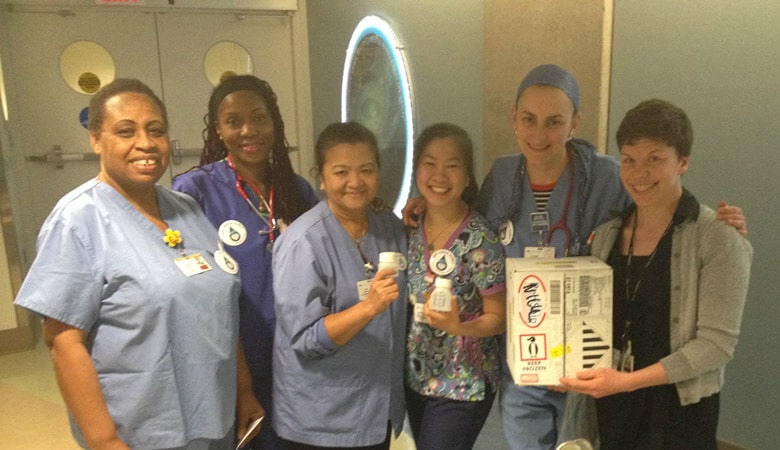
Originally posted on November 24th, 2015.
by Amber Star Merkens
My journey to becoming the NY Outreach Coordinator for Mothers’ Milk Bank Northeast was heavily influenced by a very personal experience with life in the neonatal intensive care unit (NICU). My daughter Raiya was born at 28 weeks, and she suffered multiple life-threatening complications, including a battle with necrotizing enterocolitis (NEC). NEC is a condition which can be almost entirely prevented and treated with a diet of human milk. Raiya was in the NICU for 182 days, and is now a healthy and happy 2 year old, full of strength and joy. It is clear to me that Raiya’s ability to beat the odds was hugely due to the fact that she received my milk during her hospitalization, and I can say without a doubt that she and I owe our breastfeeding success to one exceptional nurse.
Dara Barnett, a lactation consultant and NICU nurse at Maimonides Medical Center in Brooklyn, is a very special person who dedicates herself to her work with admirable zeal. She makes life in the NICU manageable and even joyful for the families she works with – gently guiding them as they work toward their breastfeeding goals, tenderly caring for their tiny infants, and tirelessly advocating for family-centered care. She provided me with invaluable evidence-based information, encouraged me to keep going when faced with breastfeeding challenges, provided a safe refuge in a chaotic environment, and pointed me in the direction of donating my milk to those in need when I eventually realized that I had pumped more than my own baby could use.
Dara also helped in bringing Mothers’ Milk Bank Northeast to Maimonides. Thanks to Dara and her colleagues, the tiniest and sickest babies at Maimonides now have access to pasteurized donor human milk when their mothers are unable to provide their own. We at Mothers’ Milk Bank Northeast are of course thrilled to provide milk to these babies, and as a NICU parent I know firsthand how incredible it must be for families to have the donor milk option available. The many medicinal benefits of human milk for premature and fragile infants are becoming well known, but the stress of being able to pump enough, to keep up milk production, and to teach a tiny, weak baby to successfully breastfeed is huge.
I recently had the pleasure of speaking with Dara about her career, the rewards and challenges of breastfeeding in the NICU, and how the new donor milk program is going.
How long have you worked in the NICU at Maimonides?
I’m coming up on five years at the end of this year! It’s going by quickly.
You are both a NICU nurse and an IBCLC. Tell us about why you decided to do both.
I was a NICU nurse before I was an IBCLC, and long before I was either I was just a breastfed baby who came from a big breastfeeding family and community. I think that the idea of breastfeeding being normal was always a part of my story, and when I started working in the NICU at Maimonides, I was pretty struck, and disappointed, by how little breastfeeding was happening. At some point I also became aware that some of the babies in the NICU had plenty of their mothers’ milk, and some had none. Some had milk for the entire NICU stay, and others just for a day or two. Even though at the time I didn’t have a good grasp of why that happened, it really bothered me. It seemed to me like sort of a health disparity.
To make a long story short, I became kind of obsessed with breastfeeding and human milk, particularly in NICU, started working towards the IBCLC, and very fortunately, ended up taking a position that no one else apparently wanted in our NICU. I’m a staff nurse but about half of my time is dedicated to providing lactation support for NICU families, and the other half is dedicated to bedside nursing.
What does the breastfeeding culture look like in New York City through the eyes of an RN/IBCLC?
I’m not sure I have a great view of NYC breastfeeding culture as a whole. I’m pretty well entrenched in my little corner of Borough Park, and being almost solely NICU based, our expectations are a little different than for the general population. To sum it up though, I think some families expect to breastfeed; it is simply part of their culture, and it wouldn’t occur to them not to do so.
One of my favorite things to talk with NICU families about is breastfeeding culture in their native countries; it’s super interesting to hear about all of the rituals, practices and expectations other cultures have surrounding childbirth and breastfeeding. A lot of families have no opinion at all about infant feeding, which is too bad, and I think reflects on the prenatal care and caregivers more than anything else. Sometimes it seems that I have to spend all day trying to convince families of the importance of human milk, which can be hard to do when they’re already in a stressful situation. But other times, I get to protect the wishes of a family who wants to only provide breast milk for their baby.
How do the benefits of human milk differ for sick and premature babies compared with healthy full-term babies?
Human milk is good for human babies, period, and we could make lists until tomorrow of all the good stuff. In the NICU, though, we say that for the sick and premature babies, human milk is medicine before it is nutrition. It’s vital, lifesaving stuff that protects the most fragile lives in totally miraculous yet scientifically validated ways.
How well is breastfeeding supported, encouraged, and protected in the NICU environment?
Breastfeeding is widely supported in our NICU. We all recognize the benefits of breastfeeding, and the benefits of human milk for all babies. I don’t think there is a NICU nurse or physician who would dare argue otherwise.
I think it’s also fairly well encouraged – but often within the constraints of the NICU timeframe (Please come breastfeed your baby. At 11 am. Don’t be late.). As NICU nurses, we are usually busy taking care of several babies at once, and a baby’s nurse may not be able to sit with a mother and provide breastfeeding support when things aren’t going well behind the breastfeeding screen. It’s not because she doesn’t want to; it may be because she’s taking care of a really sick baby on the other side of the room, or it’s a complex breastfeeding issue that a NICU nurse doesn’t need to know how to address. A lot of moms need encouragement, and we’re working hard in our NICU to intervene here. I’m sending a handful of our nurses to CLC training this winter and spring – hooray!
Protection is probably where we have the most work to do. Human milk is protected in our NICU. We no longer give smallest babies artificial milk. We wait for mother’s milk or offer donor milk. But breastfeeding itself isn’t as well protected. When a family comes into NICU and says, “We are a breastfeeding family, we only want our baby to have her mother’s milk,” that’s one thing. But unless we have that explicit instruction, it’s difficult to protect breastfeeding, particularly exclusive breastfeeding. I think it’s a combination of factors. Many mothers can’t get down to the NICU soon after delivery, we’re not set up to have mothers room-in, we schedule our cares and feed babies every 3 hours, and those factors make it difficult. It’s something to work on.
What are some specific challenges NICU moms face when it comes to getting breastfeeding established?
So many! I’d say that the biggest challenge is separation of mother and baby, and this goes for the bigger babies and the smallest preemies. A lot of our babies need immediate care, which obviously has to happen, but it takes away from early mother-baby contact that is so crucial for bonding and breastfeeding. We recognize that mother-infant separation is a barrier to breastfeeding, and we are working hard in our NICU to increase early skin-to-skin once baby is stabilized. For a baby close to term, this should include early breastfeeding, which certainly helps to get breastfeeding established. For the small preemies, starting kangaroo care as soon as medically feasible is essentially the first baby-baby step towards establishing breastfeeding, in addition to providing a whole host of other benefits. Sometimes our NICU moms are sick themselves, and they can’t be with their babies.
Another big barrier to getting breastfeeding started in the NICU is the time/space issue. We’re in Brooklyn and have shared patient rooms, so space is at a premium. We do our best to provide privacy with curtains and screens, but you’re still in the middle of a busy unit, which isn’t always conducive for a peaceful breastfeeding experience.
The scheduling of NICU cares and feeding – how often we assess and do hands-on care of the babies – can also be a challenge for NICU moms and babies. When feeding time doesn’t align with when baby wants to nurse (which is totally normal, babies aren’t little clocks) or when mom isn’t available to spend a couple of quiet hours learning her baby’s cues, it can be stressful and falsely reinforce that breastfeeding is “hard” or needs to be “scheduled.” Similarly, the general NICU routine can set moms up for false expectations that interfere with healthy breastfeeding relationships – for instance, that babies can only eat at certain times, or that we must make sure a baby eats a specific quantity at every feeding. I think it can really throw a mom’s confidence, in particular a new mom who doesn’t yet feel sure in her ability to nurse her baby.
What are some strategies nurses and loved ones can use in supporting NICU moms who are trying to breastfeed or pump?
I think if we all remember what normal newborn behavior looks like and what is expected in terms of breastfeeding behavior, we could serve breastfeeding families more effectively and more kindly. Using appropriate and affirmative language with respect to breastfeeding or pumping is also really important. The human body is amazing, and lactating women are totally amazing. They should be given nothing less than total respect and support.
How did you get interested in the use of donor milk?
We recognize the importance of mother’s milk, and human milk for all babies, but in particular for our sickest and smallest babies in the NICU. Most of our mothers want to and are able to provide their milk for their babies, but there are always exceptions. And often the exceptions get sicker with artificial milk. It kind of goes back to the way I think about lack of human milk as a health disparity.
A couple of years ago the NICU team decided that it was time to start moving in the direction of making donor milk available, and we’ve finally finished the process and have been offering it since June. It’s been great, and really well accepted by the NICU staff and families.
Under what circumstances is donor milk used?
We work really hard to help all of our mothers who want to initiate a milk supply make a nice, robust one. We want to give all of our babies nothing except their mother’s fresh milk. But things happen, and sometimes our mothers are sick, or have a lot of other things going on, and it doesn’t go as planned. So if a baby is born less than 1500 grams, or less than 32 weeks, or with a GI anomaly, and their mom isn’t able to produce enough milk for them, we talk about offering donor milk to make up the difference between what the baby needs and what the mom is producing. We don’t provide donor milk for the entire NICU stay; at some point we wean to formula, but we make sure the babies are big enough, old enough, and past the period when they’re most likely to develop a late onset GI infection.
How have families responded to donor milk being offered at Maimonides?
You know, the response has been largely positive. I’ve had a couple of mothers who have expressed relief, and have been almost grateful, when we started talking about donor milk. Pumping wasn’t going well, they had a lot of other things going on, as most NICU families do, but they knew how important human milk was for their babies and wanted to be able to provide it. It’s been a really good option to have.
Have you noticed any increase in awareness, either from staff or families, about the value of human milk since the hospital began offering donor milk?
I hear a fair amount of talk among the staff about the cost of donor milk, not always in a harm-reduction way, but in a way that I think enables us to have a dialogue on the value of human milk. As nurses we don’t really know how much the IV nutrition costs, or how much we pay for a week of antibiotics, but it’s easy to hold up a bottle of donor milk and say “This is $11 – isn’t it great that we’re going to spend $11 today so this baby will have a better shot at a good outcome?” In the scheme of things, donor milk is much so much more cost-effective than complications of artificial milk. Someday we’ll all be able to talk about the value of human milk in a context broader than the dollar, but for now, it’s a great start, and I think a good perspective for all involved.
Without disclosing particulars, tell us a story of a mother and baby who inspired you.
I worked with the mom of a baby born really prematurely. The mother had several other children and had never entertained the thought about breastfeeding – hadn’t ever tried. Despite some initial reluctance, we talked about all of the benefits of her milk for her baby, and she was on board. We started hand expressing and I got her set up on the pump and we were able to get a bit of colostrum for swabs for the first day. The next morning I went to check in on the mother and she had had a complication overnight and had herself been moved to the ICU. When I found her in her ICU room she was intubated – breathing tube down her throat, but not sedated. And pumping. I was totally floored, and completely moved. This mother, who 24 hours previously had no intentions of providing breast milk for her baby, was so sick, but was doing everything in her power to help her child. It’s a sight, and a family, I’ll always remember.
Is there anything you would like to tell our donors and potential donors?
Donating milk is such a beautiful act of kindness and generosity. Know that your milk is actively saving lives, and is deeply and gratefully appreciated.








